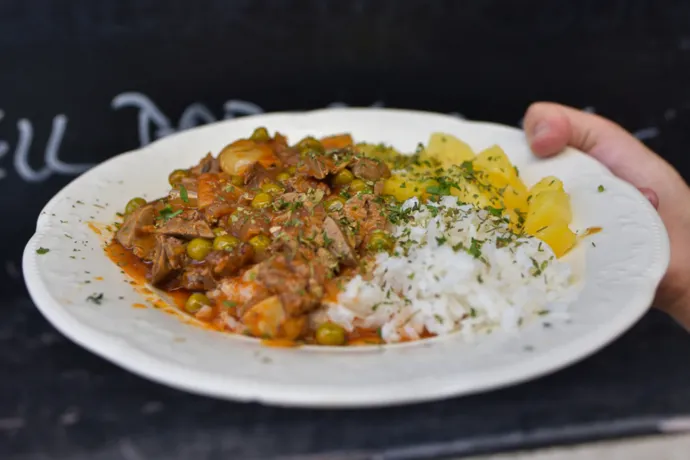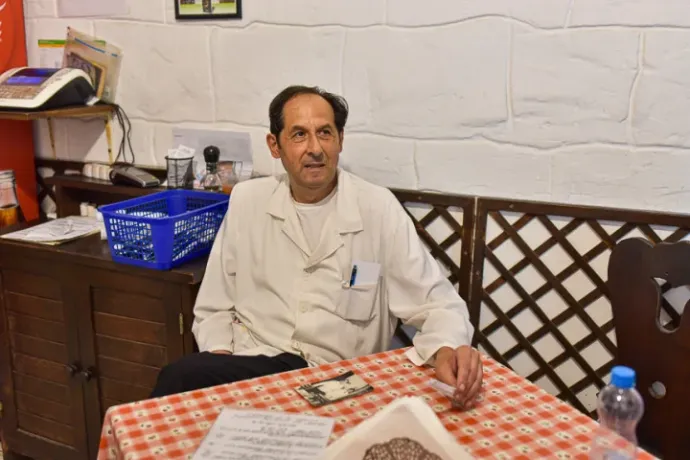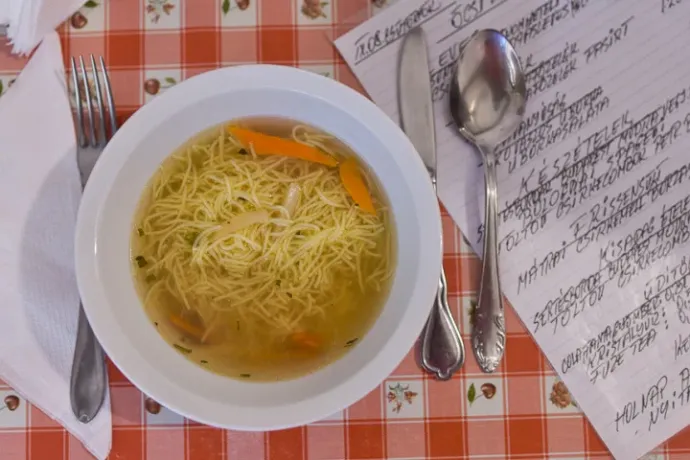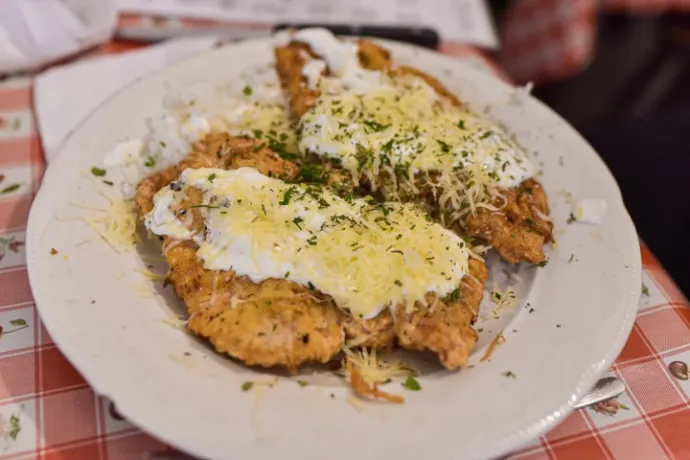
It must be stated at the outset that certain topics tend to divide Budapesters. Nothing is black or white, of course, and there are nuances to everything, but one thing is sure: there are those living in the capital who have never been to Öcsi’s, and there are those who have, and regularly return, talk about it and daydream about it.
Öcsi’s clientele is generally the same every day. The eatery is so important to those who live in the eighth district that during the crisis caused by Covid and the current economic crisis, all its regulars have at least once spoken to another Öcsi regular about their concern for the future of the place.
So these are the two groups in Budapest: those who go to Öcsi’s, and those who don’t. (My colleague and I went together to check out “the Öcsi experience” – it might not be surprising that these words are written by an “Öcsi-regular”, Réka Molnár).
Öcsi's is such a different world that it might be easier to refer to it as a miracle. You can see something here that you rarely see in Budapest: strangers sharing a table, eating, talking, wishing each other “bon appétit”, being kind, and to top it all off, the food is wonderful. Öcsi’s is not quite time travel, it is more like traveling into another matrix, entering a new world and leaving it feeling completely full and refreshed. The first visit is always a bit scary. Standing around, hesitating, wondering whether to go in. Then the ice breaks and all that's left is the desire to go back.
By the way, the reason for the first scare is exactly the same as the magic of the place. Quite simply, the restaurant has nothing to do with the things a Budapest restaurant-goer is used to – at the time of our visit there was a large family at the restaurant having a meal. Either of them were happy to tell us about the history of the restaurant – since everyone knew it by heart. This is a place where legends and real Öcsi-fans are born.
The more one keeps coming here, the greater their curiosity about the kitchen, and the bigger their love for the couple that works here will be. And then one finds themselves telling others about their first time at Öcsi’s, or their first “mátrai borzaska” (a dish named after the Mátra hills in Hungary, literally: “Unkempt meat from Mátra”. In reality, it is pork chops coated in a mixture of grated potatoes, eggs and flour, and topped with a mix of sour cream, garlic and cheese) – which I still maintain is the best meal one can have there.
You also learn quickly that you should get to Öcsi’s by opening time, because you will otherwise miss out on the daily menu. Which isn’t actually such a big problem: I have arrived late before, and I ended up having the best breaded meat of my life. But here we must turn to my colleague, Bori Ács, and allow her to share about her first experience at Öcsi’s:
I arrive at Öcsi’s eatery at half past eleven, since I heard that it often happens that all the food is gone within half an hour. Behind the half-drawn shutter, I can see several people already sitting inside, while some others are loitering in the street as they wait for the entrance to be fully opened. There is already a special mood inside, I hear people yelling across tables things such as: “What do you mean, you’re having chicken, I thought you can’t stand poultry!”, and the gentleman wearing a white coat, who is serving up the food, addresses each guest by their first name. I don't dare go in, I feel as if I've arrived at a party where the person who invited me is not present and I don't know anybody else.

At this point, three young men standing behind me tell me to go ahead and sit down already. I mumble that there are no available seats, but they look at me like I am totally crazy, and point to a table where someone is already having lunch: “but there are three chairs over there!”
In the Budapest I live in, complete strangers do not sit at the same table, but it seems to be the norm here.
A laid-back young guy hops down next to a ninety-something lady: “Good day, may I have lunch with you?” Ordering is done by yelling: “Feri, my dear, I need a drumstick and a small portion of the Budapest special!”. A few older gentlemen look at the chalkboard and grumble because there is no main dish available under two thousand forints, and there is no breaded meat listed either, so they decide to move on. But before leaving, they greet a guest or two with a handshake and a “bon appétit!” at each table. Their grumbling is good-natured, they are not angry as they leave.
We finally go in, and sit down next to a man who is eating kale stew (kelkáposzta főzelék). Thankfully, the tables are so close to each other, that in the next few minutes we can take a look at pretty much every single dish available – which makes our decision much easier. We quickly discover that the portions are huge, but thankfully, the small, handwritten menu informs us that it is possible to request a small portion of almost all the dishes. We ask for a small portion of bone broth, but as we find out, it’s exactly as big as a normal portion would be at an average restaurant.
The owner is confused when he notices the camera: “You are photographing our soup?” And then he adds with a sigh: “I wish I was selling the whole place!” But he says this so jovially, that it’s hard to believe he is actually burnt out.

I can't take my eyes off the old ladies eating quietly, and the chatting regulars. I find myself wishing I wasn't an outsider here, and that Feri would address me by my nickname too. The bone broth arrives in no time. It's always on the menu, while the other items vary. The choice is usually between two soups, one vegetable stew (főzelék), and three or four main courses. We are served an average soup, but it makes me happy to actually be able to taste the bone, and the collagen, while the pasta in it has perfect consistency. At the average small restaurant, one can smell the artificial flavoring of soups from afar – they have either been over-salted or are simply made from bouillon cubes.
The dish called “Budapest-slice” is a grilled pork chop with a sauce that includes liver, mushrooms and pepper, and it’s served with rice and potatoes. The best part about it is that it differs from my school cafeteria memories in that everything has the exact consistency it should: the liver is not overcooked, the pork chop is not dry, and the pepper has not fallen apart. I expected everything to be just like at the school cafeteria, but it isn’t: everything here tastes just like the flavors in my vague childhood memories of restaurant food in the early nineties.

This, of course, is no coincidence, because Öcsi’s eatery opened in 1980, and it’s named after the father of the man who served us our food during our visit.
“Everyone here knew my dad, he was a real restaurant guy. He never asked the guests what they wanted. He looked at them, and simply said “I know what you’ll have!” and brought the food. He was my role model"
-Feri says.
He runs the place with his wife, Erzsi: she does the cooking, and he serves the food. The guests are almost all regulars, everyone knows each other, the group only changes very slowly. But the needs do change, Feri and Erzsi tell us. According to them, people would eat Wiener schnitzel every day if they could, but they don’t make it every day. Roast pork a’la Brasov, macaroni Milanese, crépes a’la Hortobágy, goulash, and beef stew are their most popular dishes.
The menu often includes less-known dishes, which – as Erzsi tells us – are more complicated to make, but she still makes them, because they are very successful. One of these is the pork chop a’la Csák, which is a pork chop topped with the Hungarian version of ratatouille and an egg, or the crépe a’la Hortobágy which has a meat filling. “Whether we like it or not, the regulars are always here at 11.15, and by 3 pm, all the food is gone. But we never let anyone leave hungry – she says: when everything’s gone, we make some breaded meat.”
We asked them why they never took steps to go bigger, given that they have always been so popular. "We don't want to grow any more, we just want to make it to retirement – when we did try to expand, we lost a lot of money. Now, with the prices going up, we're about to close down anyways".
Despite his lamenting, we saw nothing but smiles on Feri's face while we were there. “There used to be a lot of joy in this job, but there is much less of it now. The satisfaction of the guests brings us joy, seeing the same faces come in again and again means they like our food. A lot of people don't understand, they have no idea what a hard job this is. We start work at 4.30 in the morning. We have no help, because even though some have come here to work, they soon realized how hard they have to work”.
As we get ready to leave, an American couple requests a table for two. Feri just spreads his arms wide, signaling that they may sit anywhere, and Erzsi heads toward the kitchen. But before she goes, she admonishes us to come back soon, because we haven't had their "Csáki slice" yet, and we must try it, it is delicious.
If you enjoyed this article, and want to make sure you don't miss similar content in the future, subscribe to the Telex English newsletter!